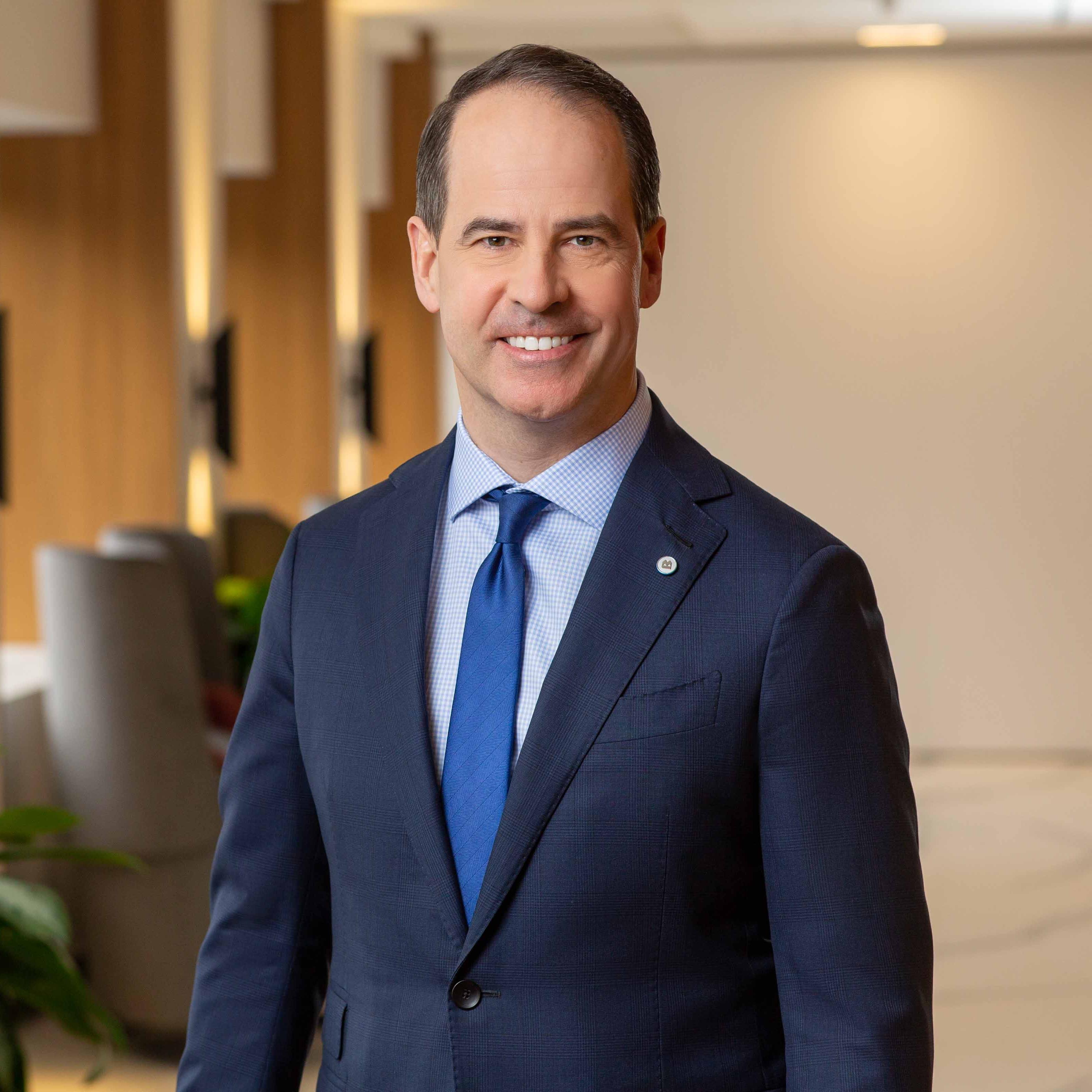
Doubling Down on the North American Advantage
-
bookmark
-
print
Over the past year, the world has become a more fragmented and uncertain place. Geopolitical challenges faced today are not those of the 1980s; they cannot be contained by lines on a map, nor can the ways we’ll address them. As Americans gather to celebrate Independence Day today, just as Canadians celebrated our national holiday this weekend, there is no better time to reflect on how we can face those challenges, together.
I come at this from the perspective of a banker whose Canadian and U.S. investors, employees and customers have supported our bank’s growth over its 205-year history to become the 8th largest in North America by assets. With our recent acquisition of Bank of the West, our North American footprint means we’re focused on making this region the most competitive and innovative it can be, so that our clients can continue to have the world’s greatest opportunities to make progress.
This calls for focusing more on what connects our two nations than what sets us apart. As President Biden and Prime Minister Trudeau said when they met earlier this year, “Our enduring partnership is based on a mutual commitment to shared security, shared prosperity, and shared democratic values, including the importance of fighting climate change and an abiding respect for human rights and the rule of law.”
The USMCA, the free-trade pact governing trade between Canada, the U.S. and Mexico, is the world’s most comprehensive trade agreement and fundamental to the economic security of our nations. No party to it can afford for it to be weakened, nor, as the most recent renegotiation of USMCA showed, can we afford complacency. Today, the 36-month clock is ticking towards the agreement’s statutory review deadline of July 2026, with national elections scheduled for all three countries in the interim.
Many can easily forget the scale of the Canada-U.S. relationship because of its quiet success. The province of Ontario ships more to the state of Michigan than Canada sells to China. More than 30 U.S. states count Canada as their largest export market – and for America’s largest exporters, the states of California and Texas, Canada is the number-two destination after Mexico.
Security, in all its forms, has become our major preoccupation. For the most critical commodities – be it food, energy, computer chips or battery components – security of supply is on everyone’s mind. We in North America are fortunate to have ample sources of what we need most, and a willingness to share with each other. Energy security affects us all, and it cannot be achieved without expanding energy flows across borders, whether that’s transmission lines or pipelines, as many sectors transform through electrification – with transportation leading the way.
As we do, capturing the economic opportunity for Americans and Canadians to lead the production of the most innovative electric vehicles, built from raw materials sustainably sourced and locally processed, means we need to see significant development of mining and mineral sources and supply chains across our geography. There can be no doubt: our product will be more attractive, more competitive, and yield the highest local economic benefit when the North American community builds it together.
The movement of energy and other natural resources is job one – and it must be tackled as a continental imperative. Climate change and energy policy are inextricably linked. That’s why so much is riding on the success of the Canada-U.S. Energy Transformation Taskforce, struck in March when Canadian and U.S. leaders met in Ottawa.
This year’s wildfires – hitting as early as they have and with unprecedented environmental impact across borders – underline the urgency of tackling climate change together, just as the heroic firefighters drawn from Canada, the U.S. and around the world have combined to fight them. Cross-border responses are the only way to manage issues that affect us all, as Americans and Canadians in the largest cities across the Northeast now understand what the West Coast has known for years: wildfire smoke doesn’t respect state, provincial or national borders.
Finally, although the scourge of nation-to-nation military conflict has returned through land war in Europe, we also need a shared approach to the cybersecurity challenges facing North American companies and consumers. As the global banking industry knows well, cyber threats occupy the top of risk maps. Government-industry collaboration across borders is crucial to preventing attacks on critical regional infrastructure and to combatting criminals working to defraud consumers.
There have been plenty of fireworks this weekend and more to come tonight, and we can expect plenty more geopolitical fireworks in the year ahead too. The progress we can make on this continent via strengthening the flows of energy and natural resources that power our economies, aligning efforts to counter climate change, and fighting cybercrime will help us more powerfully realize economies of scale and new opportunities throughout our region. The greater we press North America’s strategic global advantages and yield local benefits, the greater the understanding will be of the stakes for political decision makers in the 2026 renewal of our foundational free trade agreement. With much to celebrate in each of our respective countries, Canada and the U.S. truly have so much more to celebrate, together.

Doubling Down on the North American Advantage
Chief Executive Officer, BMO Financial Group
Darryl is Chief Executive Officer of BMO, the eighth largest bank in North America by assets, serving over 13 million customers across Canada, the United States, an…
Darryl is Chief Executive Officer of BMO, the eighth largest bank in North America by assets, serving over 13 million customers across Canada, the United States, an…
VIEW FULL PROFILE-
Minute Read
-
Listen
Stop
-
Text Bigger | Text Smaller
Over the past year, the world has become a more fragmented and uncertain place. Geopolitical challenges faced today are not those of the 1980s; they cannot be contained by lines on a map, nor can the ways we’ll address them. As Americans gather to celebrate Independence Day today, just as Canadians celebrated our national holiday this weekend, there is no better time to reflect on how we can face those challenges, together.
I come at this from the perspective of a banker whose Canadian and U.S. investors, employees and customers have supported our bank’s growth over its 205-year history to become the 8th largest in North America by assets. With our recent acquisition of Bank of the West, our North American footprint means we’re focused on making this region the most competitive and innovative it can be, so that our clients can continue to have the world’s greatest opportunities to make progress.
This calls for focusing more on what connects our two nations than what sets us apart. As President Biden and Prime Minister Trudeau said when they met earlier this year, “Our enduring partnership is based on a mutual commitment to shared security, shared prosperity, and shared democratic values, including the importance of fighting climate change and an abiding respect for human rights and the rule of law.”
The USMCA, the free-trade pact governing trade between Canada, the U.S. and Mexico, is the world’s most comprehensive trade agreement and fundamental to the economic security of our nations. No party to it can afford for it to be weakened, nor, as the most recent renegotiation of USMCA showed, can we afford complacency. Today, the 36-month clock is ticking towards the agreement’s statutory review deadline of July 2026, with national elections scheduled for all three countries in the interim.
Many can easily forget the scale of the Canada-U.S. relationship because of its quiet success. The province of Ontario ships more to the state of Michigan than Canada sells to China. More than 30 U.S. states count Canada as their largest export market – and for America’s largest exporters, the states of California and Texas, Canada is the number-two destination after Mexico.
Security, in all its forms, has become our major preoccupation. For the most critical commodities – be it food, energy, computer chips or battery components – security of supply is on everyone’s mind. We in North America are fortunate to have ample sources of what we need most, and a willingness to share with each other. Energy security affects us all, and it cannot be achieved without expanding energy flows across borders, whether that’s transmission lines or pipelines, as many sectors transform through electrification – with transportation leading the way.
As we do, capturing the economic opportunity for Americans and Canadians to lead the production of the most innovative electric vehicles, built from raw materials sustainably sourced and locally processed, means we need to see significant development of mining and mineral sources and supply chains across our geography. There can be no doubt: our product will be more attractive, more competitive, and yield the highest local economic benefit when the North American community builds it together.
The movement of energy and other natural resources is job one – and it must be tackled as a continental imperative. Climate change and energy policy are inextricably linked. That’s why so much is riding on the success of the Canada-U.S. Energy Transformation Taskforce, struck in March when Canadian and U.S. leaders met in Ottawa.
This year’s wildfires – hitting as early as they have and with unprecedented environmental impact across borders – underline the urgency of tackling climate change together, just as the heroic firefighters drawn from Canada, the U.S. and around the world have combined to fight them. Cross-border responses are the only way to manage issues that affect us all, as Americans and Canadians in the largest cities across the Northeast now understand what the West Coast has known for years: wildfire smoke doesn’t respect state, provincial or national borders.
Finally, although the scourge of nation-to-nation military conflict has returned through land war in Europe, we also need a shared approach to the cybersecurity challenges facing North American companies and consumers. As the global banking industry knows well, cyber threats occupy the top of risk maps. Government-industry collaboration across borders is crucial to preventing attacks on critical regional infrastructure and to combatting criminals working to defraud consumers.
There have been plenty of fireworks this weekend and more to come tonight, and we can expect plenty more geopolitical fireworks in the year ahead too. The progress we can make on this continent via strengthening the flows of energy and natural resources that power our economies, aligning efforts to counter climate change, and fighting cybercrime will help us more powerfully realize economies of scale and new opportunities throughout our region. The greater we press North America’s strategic global advantages and yield local benefits, the greater the understanding will be of the stakes for political decision makers in the 2026 renewal of our foundational free trade agreement. With much to celebrate in each of our respective countries, Canada and the U.S. truly have so much more to celebrate, together.
You might also be interested in

Women are Leading Across the Landscape of Climate and Sustainability
Canada Has an Opportunity to Become a Global Leader in Carbon Dioxide Removal

Extreme Temperatures: How North American Cities Amplify Climate Change
Three Keys to Unlocking Energy Transition: Partnerships, Permitting, and Finance
How the Energy Sector Is Helping Canada Achieve Its Decarbonization Goals

Quick Listen: Darryl White on the Importance of US-Canada Partnership
Driving Innovations In Tech To Strengthen Climate Resilience With Climate Engine’s Spatiafi, Built On Google Cloud
North American Agriculture’s Role in Meeting the Global Food Insecurity Challenge – US-Canada Summit
Not All Carbon Credits Created Equal: BMO Global Metals, Mining & Critical Minerals Conference
Is Green Financing for Nuclear the Next Frontier in the Energy Transition?












